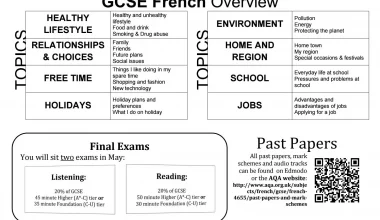Failing your GCSEs can be a disheartening and stressful experience. But what happens if you fail them not just once, but twice? The repercussions of failing your GCSEs multiple times can have a significant impact on your future educational and career prospects.
GCSEs are a very important set of exams taken by students in the UK at the end of their secondary education. These exams determine a student’s academic abilities and are often a key factor in college and job applications. Failing them once can be tough, but failing them twice can be even more challenging to overcome.
If you find yourself in the situation of failing your GCSEs twice, it’s important to understand the consequences and potential paths forward. From retaking exams to alternative educational routes, there are options available to help you move past this setback and work towards a successful future. Read this article to learn how.
Table of contents
- What are GCSEs?
- Why Fail GCSE the First Time?
- Can You Go To College If You Fail Your GCSEs Twice?
- How Many Times Can You Re-sit for GCSEs?
- What Happens If You Fail Your GCSEs Twice?
- Are there any support services available for students who fail their GCSEs?
- What should I do if I fail my GCSEs and feel lost about my next steps?
- FAQs on What Happens If You Fail Your GCSEs Twice
- Conclusion
- References
- Recommendations
What are GCSEs?
GCSEs, or General Certificate of Secondary Education, are a set of standardized examinations taken by students in England, Wales, and Northern Ireland. They typically mark the end of compulsory education and serve as a critical qualification for further studies and employment opportunities.
GCSEs encompass a range of subjects, including English, mathematics, science, humanities, and creative arts. Students usually take these exams at the age of 16.
The grading system traditionally ranged from A* (the highest) to G (the lowest), but it has been replaced by a numerical system ranging from 9 (highest) to 1 (lowest).
See also: Top 15 Websites for GCSE Revision in 2024 with Answers
Why Fail GCSE the First Time?
Failing GCSEs for the first time can be attributed to a lot of reasons, both academic and non-academic. It’s essential to understand these factors to address them effectively. Here are some common reasons:
- Lack of Preparation
- Poor Study Habits
- Exam Anxiety
- Health Issues
- Learning Disabilities
- Inadequate Resources
- Timing and Fatigue
- Misunderstanding Exam Format
- External Distractions
Can You Go To College If You Fail Your GCSEs Twice?
Failing your GCSEs twice can indeed pose challenges when it comes to traditional college entry, as many colleges and universities require a minimum set of qualifications, which often include a certain number of GCSE passes at specific grades.
However, it’s essential to note that when you fail your GCSEs twice, all hope is not lost, and there are alternative pathways to higher education and career success even if you fail your GCSEs twice. Here are some options to consider:
- GCSE Resits: If you’ve failed your GCSEs, you may have the option to retake the exams in the subjects you failed. This is a common route for students who wish to improve their grades and meet the entry requirements for college.
- Alternative Qualifications: Some colleges and vocational institutions offer courses and programs that don’t require specific GCSE passes.
- Vocational Courses: You can explore vocational courses like BTECs or NVQs, which may have lower entry requirements than traditional A-levels or university courses.
- T-levels: T-levels are a new type of vocational qualification in the UK that combines classroom learning with industry placements.
- Open University: The Open University offers flexible, distance learning programs that often have more lenient entry requirements. You can work toward a degree while maintaining other commitments.
- Seeking Guidance: Consider speaking with a careers advisor or educational consultant who can provide tailored advice based on your specific goals and circumstances.
Read: What is an Internship in UK? Meaning, Definitions & How to Get One
How Many Times Can You Re-sit for GCSEs?
You can generally retake GCSE exams as many times as you wish, although there may be practical limitations and considerations to keep in mind:
School or College Policies
Individual schools or colleges may have their policies regarding GCSE resits, including limitations on the number of resits allowed in a given academic year. It’s important to check with your educational institution for their specific guidelines.
Course Duration
Keep in mind that your age and the duration of your course can affect how many times you can reasonably resit GCSEs. Most students take GCSEs at around age 16, and they typically have a few years before they transition to other educational or career paths.
Timelines and Deadlines
There are specific exam sessions for GCSEs each year, and you’ll need to adhere to these timelines when scheduling resits. Planning your resits strategically is essential to ensure you have adequate time to prepare and meet your academic and career goals.
Financial Considerations
Resitting exams often comes with associated fees. It’s important to consider the financial implications of multiple resits.
Academic Progression
While there is no formal limit on resits, repeatedly retaking GCSE exams may affect your academic progression. Consider whether pursuing alternative qualifications or pathways might be a more efficient and effective route to your goals.
Read also: Why Many Fail GCSE Exams in 2024
What Happens If You Fail Your GCSEs Twice?
If you repeatedly fail your GCSEs, you can still retake them. However, retaking GCSE exams after failing them multiple times can be challenging due to various factors such as time constraints, financial burden, and emotional cost.
Each GCSE exam has a different price depending on the subject and the exam board you book with, so the financial cost can add up over time.
Scheduling and preparing for these exams can be daunting, especially for individuals who have other financial responsibilities, such as childcare, rent, food, and health insurance. The cost of registering for exams each year, whether taken online or in person, is an additional expense that needs to be considered.
It’s essential to recognize that retaking GCSE exams immediately after failing them may not significantly improve your chances of passing. It’s often recommended to take some time between rewrites to allow for more comprehensive preparation.
This break can provide the opportunity to address the issues that contributed to the previous failures, whether they are related to study habits, exam anxiety, or other factors.
By taking a more measured and strategic approach to retaking GCSEs, you can increase your likelihood of success and reduce the emotional toll that repeated failures can take.
Also read: What Happens If You Walk Out of a GCSE Exam?
Are there any support services available for students who fail their GCSEs?
Yes, there are definitely support services available for students who may not have achieved the grades they were hoping for in their GCSE exams.
Many schools offer additional tutoring or revision classes to help students improve their understanding of the subjects they struggle with. It’s also worth speaking to your teachers or school counselor, as they can guide how to approach retaking exams or exploring alternative pathways.
Additionally, there are external organizations and online resources that offer support and guidance for students who need extra help after failing their GCSEs. These resources can include study guides, practice exams, and even counseling services to help students cope with any stress or disappointment they may be feeling.
Remember, it’s never too late to seek help and turn things around – there are always options available to support you on your academic journey.
What should I do if I fail my GCSEs and feel lost about my next steps?
It’s completely normal to feel overwhelmed in this situation but remember that it’s not the end of the road. First and foremost, take a deep breath and try not to be too hard on yourself.
Failing exams can happen to anyone and it doesn’t define your worth or potential.
Now is the time to reassess your options and consider alternative paths. You could retake your GCSEs, explore vocational courses, or even consider apprenticeships or work placements.
It’s important to seek support from teachers, career advisors, or mentors who can help guide you through this process. Remember, setbacks are just stepping stones towards success – stay positive and keep moving forward.
Read: How to Sit For GCSE Exams Privately: The Extensive Guide
FAQs on What Happens If You Fail Your GCSEs Twice
3, 2, and 1 are considered fail grades in GCSE exams. However, the constant, U, represents ungraded or unclassified.
Alternatives to retaking GCSEs include vocational courses (e.g., BTECs), apprenticeships, T-levels, foundation courses, and Open University programs. These pathways can lead to further education and career opportunities.
Failing GCSEs twice can limit your immediate access to traditional educational pathways, but it doesn’t necessarily mean the end of your educational or career journey.
Coping with the emotional impact involves seeking support from friends, family, and professionals. Additionally, building resilience, addressing mental health concerns, and staying motivated are crucial.
Conclusion
Failing your GCSEs twice can be a challenging and emotionally taxing experience, but it is by no means the end of your educational or career journey.
While difficulties, financial burdens, and emotional costs may be associated with what happens if you fail your GCSEs twice, there are alternative pathways and support systems in place to help individuals overcome these setbacks.
Whether through retakes, vocational courses, apprenticeships, or other educational routes, there are various avenues to pursue academic and career success.






